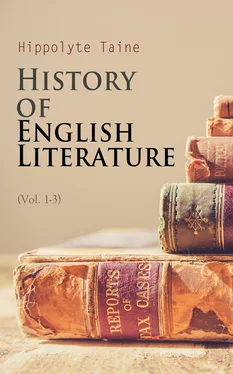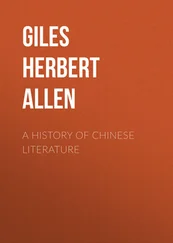Then he saw Grendel dead in a corner of the hall; and four of his companions, having with difficulty raised the monstrous head, bore it by the hair to the palace of the king.
That was his first labor; and the rest of his life was similar. When he had reigned fifty years on earth, a dragon, who had been robbed of his treasure, came from the hill and burned men and houses "with waves of fire. Then did the refuge of earls command to make for him a variegated shield, all of iron; he knew well enough that a shield of wood could not help him, lindenwood opposed to fire.... The prince of rings was then too proud to seek the wide flier with a troop, with a large company; he feared not for himself that battle, nor did he make any account of the dragon's war, his laboriousness and valor." And yet he was sad, and went unwillingly, for he was "fated to abide the end." Then "he was ware of a cavern, a mound under the earth, nigh to the sea wave, the clashing of waters, which cave was full within of embossed ornaments and wires.... Then the king, hard in war, sat upon the promontory, whilst he, the prince of the Geáts, bade farewell to his household comrades.... I, the old guardian of my people, seek a feud." He "let words proceed from his breast," the dragon came, vomiting fire; the blade bit not his body, and the king "suffered painfully, involved in fire." His comrades had "turned to the wood, to save their lives," all save Wiglaf, who "went through the fatal smoke," knowing well "that it was not the old custom" to abandon relation and prince, "that he alone... shall suffer distress, shall sink in battle. The worm came furious, the foul insidious stranger, variegated with waves of fire,... hot and warlike fierce, he clutched the whole neck with bitter banes; he was bloodied with life-gore, the blood boiled in waves." [62]They, with their swords, carved the worm in the midst. Yet the wound of the king became burning and swelled; "he soon discovered that poison boiled in his breast within, and sat by the wall upon a stone"; "he looked upon the work of giants, how the eternal cavern held within stone arches fast upon pillars." Then he said—
"I have held this people fifty years; there was not any king of my neighbors, who dared to greet me with warriors, to oppress me with terror.... I held mine own well, I sought not treacherous malice, nor swore unjustly many oaths; on account of all this, I, sick with mortal wounds, may have joy.... Now do thou go immediately to behold the hoard under the hoary stone, my dear Wiglaf.... Now, I have purchased with my death a hoard of treasures; it will be yet of advantage at the need of the people.... I give thanks... that I might before my dying day obtain such for my peoples... longer may I not here be." [63]
This is thorough and real generosity, not exaggerated and pretended, as it will be later on in the romantic imaginations of babbling clerics, mere composers of adventure. Fiction as yet is not far removed from fact; the man breathes manifest beneath the hero. Rude as the poetry is, its hero is grand; he is so, simply by his deeds. Faithful, first to his prince, then to his people, he went alone, in a strange land, to venture himself for the delivery of his fellow-men; he forgets himself in death, while thinking only that it profits others. "Each one of us," he says in one place, "must abide the end of his present life." Let, therefore, each do justice, if he can, before his death. Compare with him the monsters whom he destroys, the last traditions of the ancient wars against inferior races, and of the primitive religion; think of his life of danger, nights upon the waves, man grappling with the brute creation; man's indomitable will crushing the breasts of beasts; man's powerful muscles which, when exerted, tear the flesh of the monsters; you will see reappear through the mist of legends, and under the light of poetry, the valiant men who, amid the madness of war and the raging of their own mood, began to settle a people and to found a state.
Table of Contents
One poem nearly whole and two or three fragments are all that remain of this lay-poetry of England. The rest of the pagan current, German and barbarian, was arrested or overwhelmed, first by the influx of the Christian religion, then by the conquest of the Norman-French. But what remains more than suffices to show the strange and powerful poetic genius of the race, and to exhibit beforehand the flower in the bud.
If there has ever been anywhere a deep and serious poetic sentiment, it is here. They do not speak, they sing, or rather they shout. Each little verse is an acclamation, which breaks forth like a growl; their strong breasts heave with a groan of anger or enthusiasm, and a vehement or indistinct phrase or expression rises suddenly, almost in spite of them, to their lips. There is no art, no natural talent, for describing singly and in order the different parts of an object or an event. The fifty rays of light which every phenomenon emits in succession to a regular and well-directed intellect, come to them at once in a glowing and confused mass, disabling them by their force and convergence. Listen to their genuine war-chants, unchecked and violent, as became their terrible voices. To this day, at this distance of time, separated as they are by manners, speech, ten centuries, we seem to hear them still:
"The army goes forth: the birds sing, the cricket chirps, the war-weapons sound, the lance clangs against the shield. Now shineth the moon, wandering under the sky. Now arise deeds of woe, which the enmity of this people prepares to do.... Then in the court came the tumult of war-carnage. They seized with their hands the hollow wood of the shield. They smote through the bones of the head. The roofs of the castle resounded, until Garulf fell in battle, the first of earth-dwelling men, son of Guthlaf. Around him lay many brave men dying. The raven whirled about, dark and sombre, like a willow leaf. There was a sparkling of blades, as if all Finsburg were on fire. Never have I heard of a more worthy battle in war." [64]
This is the song on Athelstan's victory at Brunanburh:
"Here Athelstan king, of earls the lord, the giver of the bracelets of the nobles, and his brother also, Edmund the ætheling, the Elder a lasting glory won by slaughter in battle, with the edges of swords, at Brunanburh. The wall of shields they cleaved, they hewed the noble banners: with the rest of the family, the children of Edward.... Pursuing, they destroyed the Scottish people and the ship-fleet.... The field was colored with the warriors' blood! After that the sun on high,... the greatest star! glided over the earth, God's candle bright! till the noble creature hastened to her setting. There lay soldiers many with darts struck down, Northern men over their shields shot. So were the Scots; weary of ruddy battle.... The screamers of war they left behind; the raven to enjoy, the dismal kite, and the black raven with horned beak, and the hoarse toad; the eagle, afterwards to feast on the white flesh; the greedy battle-hawk, and the grey beast, the wolf in the wood." [65]
Here all is imagery. In their impassioned minds events are not bald, with the dry propriety of an exact description; each fits in with its pomp of sound, shape, coloring; it is almost a vision which is raised, complete, with its accompanying emotions, joy, fury, excitement. In their speech, arrows are "the serpents of Hel, shot from bows of horn"; ships are "great sea-steeds," the sea is "a chalice of waves," the helmet is "the castle of the head"; they need an extraordinary speech to express their vehement sensations, so that after a time, in Iceland, where this kind of poetry was carried on to excess, the earlier inspiration failed, art replaced nature, the Skalds were reduced to a distorted and obscure jargon. But whatever be the imagery, here, as in Iceland, though unique, it is too feeble. The poets have not satisfied their inner emotion, if it is only expressed by a single word. Time after time they return to and repeat their idea. "The sun on high, the great star, God's brilliant candle, the noble creature!" Four times successively they employ the same thought, and each time under a new aspect. All its different aspects rise simultaneously before the barbarian's eyes, and each word was like a fit of the semi-hallucination which possessed him. Verily, in such a condition, the regularity of speech and of ideas is disturbed at every turn. The succession of thought in the visionary is not the same as in a reasoning mind. One color induces another; from sound he passes to sound; his imagination is like a diorama of unexplained pictures. His phrases recur and change; he emits the word that comes to his lips without hesitation; he leaps over wide intervals from idea to idea. The more his mind is transported, the quicker and wider the intervals traversed. With one spring he visits the poles of his horizon, and touches in one moment objects which seemed to have the world between them. His ideas are entangled without order; without notice, abruptly, the poet will return to the idea he has quitted, and insert it in the thought to which he is giving expression. It is impossible to translate these incongruous ideas, which quite disconcert our modern style. At times they are unintelligible. [66]Articles, particles, everything capable of illuminating thought, of marking the connection of terms, of producing regularity of ideas, all rational and logical artifices, are neglected. [67]Passion bellows forth like a great shapeless beast; and that is all. It rises and starts in little abrupt lines; it is the acme of barbarism. Homer's happy poetry is copiously developed, in full narrative, with rich and extended imagery. All the details of a complete picture are not too much for him; he loves to look at things, he lingers over them, rejoices in their beauty, dresses them in splendid words; he is like the Greek girls, who thought themselves ugly if they did not bedeck arms and shoulders with all the gold coins from their purse, and all the treasures from their caskets; his long verses flow by with their cadences, and spread out like a purple robe under an Ionian sun. Here the clumsy-fingered poet crowds and clashes his ideas in a narrow measure; if measure there be, he barely observes it; all his ornament is three words beginning with the same letter. His chief care is to abridge, to imprison thought in a kind of mutilated cry. [68]The force of the internal impression, which, not knowing how to unfold itself, becomes condensed and doubled by accumulation; the harshness of the outward expression, which, subservient to the energy and shocks of the inner sentiment, seek only to exhibit it intact and original, in spite of and at the expense of all order and beauty—such are the characteristics of their poetry, and these also will be the characteristics of the poetry which is to follow.
Читать дальше












